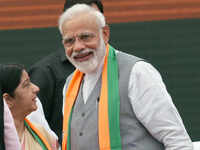SC directs parties to submit details of donations through electoral bonds
Dhananjay Mahapatra | TNN | Apr 13, 2019, 02:44 ISTHighlights
- SC said that issues arising from political funding through electoral bonds had “tremendous bearing on the sanctity of the electoral process”
- However, even after the SC order, political parties will not be able to give details of donor names, as per the procedure explained to the SC by attorney general K K Venugopal on Thursday
 File Photo: Supreme court of India
File Photo: Supreme court of IndiaNEW DELHI: The Supreme Court said on Friday that issues arising from political funding through electoral bonds had “tremendous bearing on the sanctity of the electoral process” and directed all parties to immediately submit to the Election Commission in sealed covers details of such donors, amounts donated and the bank account in which these were credited.
However, even though the court called for details of donations to be shared with the EC, political parties will not be able to give details of donor names, in accordance with the procedure explained to the SC by attorney general K K Venugopal on Thursday.
The AG had said an electoral bond was issued by the State Bank of India to a person intending to make a large donation to a political party after satisfying KYC details. SBI knows the identity of the donor and the receiver but the bank keeps details of donors in a sealed cover and sends them to a central repository in Mumbai at the end of the month.
On Friday, a bench of Chief Justice Ranjan Gogoi and Justices Deepak Gupta and Sanjiv Khanna did not heed the AG’s argument that the court should wait for the Lok Sabha polls to be over so that the effectiveness of the reform could be ascertained.
“Implementation of the measures will be tested by the results obtained in the course of the ongoing general elections and the success thereof will be known only after the elections are over. The government must be allowed a free hand to implement measures in execution of policies framed and, therefore, it is premature for the court to render any opinion on issues raised or to pass any order in the matter for the present,” the AG said.
Petitioner NGO Association for Democratic Reforms, through advocate Prashant Bhushan, had claimed that anonymous donations through bonds would kill transparency in political funding and encourage quid pro quo between the ruling party and corporate houses.
The Centre, on the other hand, argued that the bonds were an effective tool to curb massive black money in elections, with Venugopal making an earnest plea that the SC should refrain from entering what was the domain of the executive and from passing an interim order that could impact a move against black money in polls.
The bench said, “The just and proper interim direction would be to require all the political parties who have received donations through electoral bonds to submit to the Election Commission of India in sealed cover detailed particulars of the donors as against each bond; the amount of each such bond and the full particulars of the credit received against each bond, namely, particulars of the bank account to which the amount has been credited and the date of each such credit.”
Details of electoral bonds received by parties from Friday till May 15 must be given to the EC by May 30, the bench said, adding that the sealed covers (containing details of electoral bonds) would remain in the EC’s custody till further orders. The court also asked the finance ministry to delete five days from the window to make donations through bonds as the present schedule is for 55 days as against the statutorily provided period of 50 days.
Electoral bonds received by a political party contain no donor name and only mention the party name for which the donation is meant. The recipient party deposits the bond in the bank account specified for the purpose. The party would not know who has donated the money except the amount that it received, the AG had said. In such a situation, it would be difficult for the parties to give the names of donors.
After passing the interim order, the SC said it would consider the weighty issues raised by the petitioner and the Centre through an in-depth hearing. Issuance of such bonds will come to a close on April 20.
However, even though the court called for details of donations to be shared with the EC, political parties will not be able to give details of donor names, in accordance with the procedure explained to the SC by attorney general K K Venugopal on Thursday.
The AG had said an electoral bond was issued by the State Bank of India to a person intending to make a large donation to a political party after satisfying KYC details. SBI knows the identity of the donor and the receiver but the bank keeps details of donors in a sealed cover and sends them to a central repository in Mumbai at the end of the month.
On Friday, a bench of Chief Justice Ranjan Gogoi and Justices Deepak Gupta and Sanjiv Khanna did not heed the AG’s argument that the court should wait for the Lok Sabha polls to be over so that the effectiveness of the reform could be ascertained.
“Implementation of the measures will be tested by the results obtained in the course of the ongoing general elections and the success thereof will be known only after the elections are over. The government must be allowed a free hand to implement measures in execution of policies framed and, therefore, it is premature for the court to render any opinion on issues raised or to pass any order in the matter for the present,” the AG said.
Petitioner NGO Association for Democratic Reforms, through advocate Prashant Bhushan, had claimed that anonymous donations through bonds would kill transparency in political funding and encourage quid pro quo between the ruling party and corporate houses.
The Centre, on the other hand, argued that the bonds were an effective tool to curb massive black money in elections, with Venugopal making an earnest plea that the SC should refrain from entering what was the domain of the executive and from passing an interim order that could impact a move against black money in polls.
The bench said, “The just and proper interim direction would be to require all the political parties who have received donations through electoral bonds to submit to the Election Commission of India in sealed cover detailed particulars of the donors as against each bond; the amount of each such bond and the full particulars of the credit received against each bond, namely, particulars of the bank account to which the amount has been credited and the date of each such credit.”
Details of electoral bonds received by parties from Friday till May 15 must be given to the EC by May 30, the bench said, adding that the sealed covers (containing details of electoral bonds) would remain in the EC’s custody till further orders. The court also asked the finance ministry to delete five days from the window to make donations through bonds as the present schedule is for 55 days as against the statutorily provided period of 50 days.
Electoral bonds received by a political party contain no donor name and only mention the party name for which the donation is meant. The recipient party deposits the bond in the bank account specified for the purpose. The party would not know who has donated the money except the amount that it received, the AG had said. In such a situation, it would be difficult for the parties to give the names of donors.
After passing the interim order, the SC said it would consider the weighty issues raised by the petitioner and the Centre through an in-depth hearing. Issuance of such bonds will come to a close on April 20.
Download The Times of India News App for Latest India News.
Making sense of 2019
#Electionswithtimes
View Full Coverage





























All Comments ()+^ Back to Top
Refrain from posting comments that are obscene, defamatory or inflammatory, and do not indulge in personal attacks, name calling or inciting hatred against any community. Help us delete comments that do not follow these guidelines by marking them offensive. Let's work together to keep the conversation civil.
HIDE